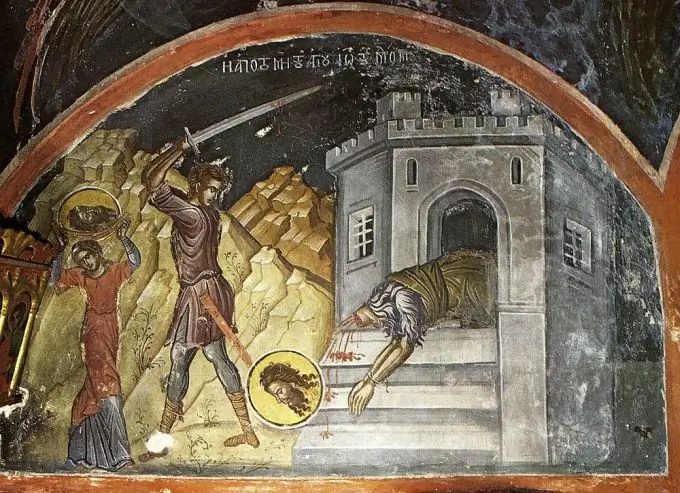- Author Antonio Harrison [email protected].
- Public 2023-12-16 07:44.
- Last modified 2025-01-22 21:44.
On September 11, in a new style, the Orthodox Church honors the memory of the holy prophet and Forerunner of the Lord John. On this day, the tragic events of the Gospel history are remembered in Orthodox churches - in particular, the death of John the Baptist.

John the Baptist is the greatest prophet who preached repentance and spiritual awakening among the people at the junction of the old and new testaments. John is also called the Baptist, since it was he who performed the first Old Testament baptism in Jordan, which was called the baptism of repentance and symbolized faith in one God. From the gospel narrative it is clear that John preached about the coming into the world of the Messiah Christ, prepared the people to accept the Savior and the Lord. Therefore, the Church also calls the prophet John the Forerunner. In his life, the prophet John was rewarded with touching the head of Christ Himself. This event took place during the baptism of Jesus in the Jordan River. The Savior himself called John the greatest righteous man of all those born on earth.
After the baptism of Jesus Christ, Saint John the Forerunner did not abandon his prophetic ministry. The Prophet continued to find a way to the hearts of the people, calling them to repentance, forgiveness of sins and conversion to God. The people especially revered John the Baptist, at the present moment in time it is quite possible to say that the Forerunner was a very famous person of ancient Israel.
In exposing the sins and vices of both the whole society and individual people, John the Baptist did not "look at faces." In particular, it is known from the Gospel narrative that the holy righteous man denounced the very ruler of Galilee Herod for the sin of adultery. The Forerunner pointed out that King Herod, breaking the law of Moses, took the wife of his living brother Philip (Herodias) as his wife. Such an atrocity and moral degradation of King Herod could not be denounced by the great preacher of repentance. As a result of accusatory words, the king ordered to put the prophet in prison, thereby isolating the latter from society. In this one can see both a personal motive and the fear that the entire Israeli people will learn about the ruler's moral atrocity. However, the king ordered to leave John alive, because he knew how much the people revere the great righteous man.
Gospel events also describe the following events preceding the death of the prophet. So, during the birthday of Tsar Herod, the daughter of the illegal wife of Tsar Salome performed a dance as a gift to the ruler to delight the eyes of the latter. Herod liked the dance so much that he vowed to give Salome whatever she asked. Salome hastened to consult her mother Herodias. Herod's wife, who hated John the Baptist for reproof, told her daughter to ask for the head of John the Baptist on a platter. With this request, Salome turned to Herod. The king was greatly saddened, but, as the Gospels say, for the sake of the oath and those reclining with him, he commanded to chop off the head of John the Baptist in prison and bring her to the banquet hall on a platter.
Thus ended the days of the life of the greatest prophet of all times and peoples. The events of the preaching of John the Baptist and the circumstances of the death of the righteous are described in the three Gospels - Matthew, Mark and Luke. At present, the Church, in memory of the beheading of John the Baptist, has established a one-day strict fast, during which it is not allowed to eat not only animal products, but also fish and vegetable oil.






